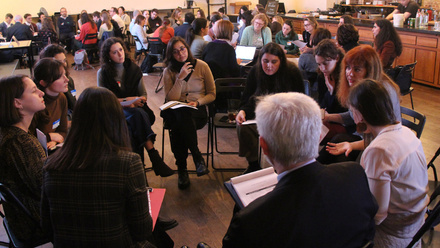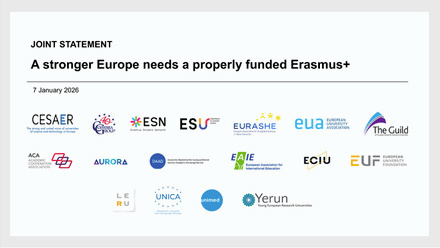Learning from Erasmus Mundus: 3 targets moving forward

As university students in the US plan to return to campus, the situation for most European students still looks uncertain. Whether in Spain or Slovakia, effects of the COVID-19 pandemic on higher education in Europe do not seem to be ending anytime soon, especially considering the relatively slow vaccine rollout. Managing internationalisation efforts in this context is muddy, even for the most well-prepared institutions and programmes, such as the high-mobility Erasmus Mundus programme. In this scenario, universities cannot simply count on the end of the pandemic to resume internationalisation efforts, and need to develop strategies to keep programmes running smoothly despite the current challenges.
The European Commission’s Erasmus Mundus Joint Master’s Degree programmes offer joint degrees in novel and needed subjects, with scholarships available for students from all over the world. The programmes have been heralded for their innovative, forward-looking structure and potential for contributing to educational convergence across the continent. As current Erasmus Mundus students and emerging higher education researchers, we were interested in investigating the impact of the pandemic and travel bans on the high-mobility Erasmus Mundus programmes. Our research sought to combine the perspectives of programme managers and students. Almost a year after we began researching the impact of COVID-19 on the prestigious programme, our analysis reveals several obstacles to salvaging post-pandemic internationalisation in Europe. With the end of the crisis not yet in sight, these findings are not only relevant now, but offer insight into readjusting internationalisation efforts in preparation for future risk management challenges.
An EU-wide response to student mental health
The pandemic revealed the lack of mental health support in European institutions. In our study of roughly 600 Erasmus Mundus students, respondents reported there was a lack of empathy with the student situation and requests to be connected with mental health services were often not met. Higher education institutions in the EU vary widely in their approach to addressing psychological well-being, and this is particularly challenging for Mundus students enrolled at multiple institutions throughout their programmes. We see a need for a comprehensive approach to mental health support for students in Europe – perhaps even the development of a national or supranational clearinghouse of support counsellors.
Agile programme management
Until recently, mobility restrictions caused by the pandemic were rather homogeneous across the world, with somewhat generalised barriers to any movement across borders and most on-site teaching suspended in universities. This new academic year will bring a different scenario. With disparate paces in vaccination and in the general control of the pandemic, universities will have to deal with the fact that some students are able to move and be involved in internationalisation abroad, while others will not. Managers might have to deal with hybrid groups, where some students attend classes online and others do so face-to-face. This can be an especially cumbersome challenge for Mundus managers, since these programmes tend to recruit students from all over the world.
Results reveal that students felt especially harmed by the late decision-making on the part of programmes
One key finding from our study can help inform managers’ decision-making regarding mobility this year. When asked to describe how the current situation affected them, 48 students reported feeling significantly harmed by the late decision-making of their programmes, and 58 reported being affected by the uncertainty about the near future of their programme, which was related to mobility, but also to the teaching mode and continuity of the programmes or scholarships. Results reveal that students felt especially harmed by the late decision-making on the part of programmes, as well as by the lack of communication in the decision-making process.
Programme managers often waited to inform students until decisions were final, and decision-making was delayed because many programmes had hopes that the fall of 2020 would witness a return to normal. In the words of one of the programme managers we interviewed: “For some time it looked like by June this should be over so we were still thinking it could take place. Making the decision to give up a normal plan was hard. At some point we did make a decision just to have certainty.” This year needs to be different: the pandemic has been going on long enough and all education abroad programmes should provide students with transparency in terms of their alternatives and possible scenarios.
Maximising the innovative use of digital resources
With the likely scenario that at least some students will not be able to participate in on-site mobility, programmes should also take advantage of the digital resources that became widespread in the past year. Our research showed some good practices in terms of utilising these resources to promote activities that would not be possible otherwise, such as inviting guest scholars, integrating alumni and promoting interaction with groups in different countries.
One important aspect of virtual mobility is to use the tools innovatively and understand that activities should be adapted to the digital reality
One important aspect of digitalisation, and of virtual mobility experiences, is to use those tools innovatively and understand that activities should be adapted to the digital reality, and not simply replicate face-to-face programming. Even for Mundus programmes that plan to return fully on-site, benefits discovered in online tools can be incorporated.
Proactive policies or reactive responses?
The impact of the pandemic on European higher education persists. Institutions – and the Commission – are at a crossroads: capitalise on this experience to develop preventative policies, or continue to treat these problems as they arise. Erasmus Mundus programmes and hosting universities should advocate for the current and future well-being of their mobile students – and their Erasmus Mundus programmes – by pushing for a prioritisation of long-term preventative measures.






